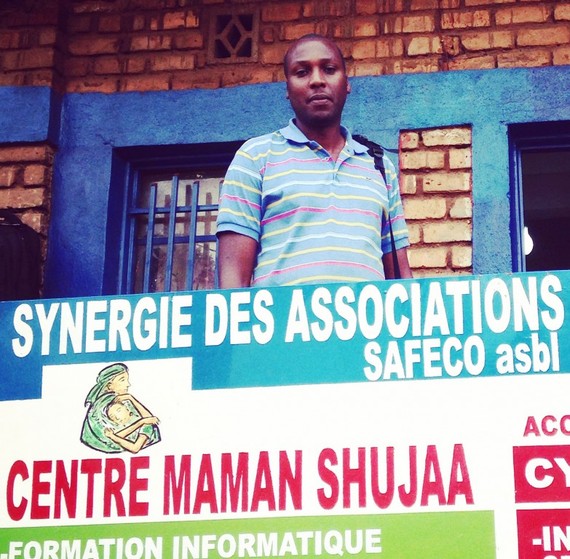Q&A with Stany Nzabas
 Through his work helping women get online and raise their voices in the Democratic Republic of Congo, Stany Nzabas hopes to see women in his country reclaim their rights.
Through his work helping women get online and raise their voices in the Democratic Republic of Congo, Stany Nzabas hopes to see women in his country reclaim their rights.
According to a 2012 study, only 1.7% of the entire population of the Democratic Republic of Congo has access to the Internet. Of these Internet users, only a fraction are women. Yet, every day women stream through the doors of the Maman Shujaa Media Center in Bukavu, DRC to use computers, network with each other, learn new skills, and to share their voices with a global audience on World Pulse. They represent different ages and ethnicities. Some are disabled. Many are leaders in organizations working to create a peaceful and prosperous Congo. All are seeking opportunities that were previously unavailable to them.
As the Program Manager of the umbrella organization that runs the Center, Stany Nzabas wears many different hats, all in service of giving women the tools and confidence to advance their leadership and take their rightful place in their communities.
What is your role at the center?
I coordinate our five trainers who teach women about digital literacy and answer questions in our computer center. Sometimes I am also involved in helping women connect. I will help them open a Skype account, or create an email address. I am here to learn what types of training they may need. I find out what additional trainings the women are asking for, like English language skills, or reporting skills, and I look for qualified teachers.
We also work in communities in the DRC. Just yesterday I was with our Girl Ambassadors group. We were in a community doing theater about women's rights. Through theater, we show that women are equal to men. We show men treating women in a bad way, and then we show how women can get their rights. We invite communities to participate.
What do you enjoy most about the work that you do?
You know I really enjoy working with women. I have also worked with men, but it was harder. When they come to you they don't tell you their weakness, they don't tell you the truth, so it was harder to help them. The women I work with here come to you with commitment and openness. They tell you everything they think on their hearts. They come to you with the will to understand their problem, and you can try to help them.
So, for example, a woman might come to our center who is the coordinator for an organization and she might say, "You know, I don't know anything related to computers." So now we can start at the beginning teaching all things related to the computer. What is the computer, how does it work, what is the importance, how to open a Word doc and write. Then after like three weeks, four weeks, she can write reports herself, send an email, use attachments.
It's really exciting here. After a training at the center, women can promote the work they are doing through the Internet, on Facebook; they can send letters, they can communicate directly with their sponsors. Now some even have their own laptops, and they know how to use the computer, so they come to our office just to use the Internet to send their documents. We see how they are growing and how our work is important.
When is the first time you remember being aware of inequalities and injustice women face in your community?
I grew up in this community so I knew about violence against women. I knew what was going on. But when I graduated from university 15 years ago is when I really started understanding gender equality. I did my university studies abroad in our neighbor country Rwanda. The government of Rwanda had an awareness campaign through universities, and I started understanding gender violence, gender equality, and the participation of women in decision-making positions. I started comparing the situation in Rwanda and the situation in my community in Congo and realizing that women in Congo--they are really, really marginalized.
What is it like for you to be a male ally for women in the DRC?
Some of my friends, they ask me what are you doing working with these women? There is a patriarchal mindset. Some of them have women in their organizations, but they are secretaries, accountants maybe, small positions. A woman, Neema, is president and founder of our organization. My friends say, "How can you work where the leader is a woman?" I just tell them if you don't work with women, who are you going to work with? I don't really fight with them. I just tell the truth. Women didn't have the same opportunities to go to school like men, but once they have education there is no difference between women and men. We are here to amplify the voices of women.
What message would you like to give to other men in your country?
I say to the men of my community, don't steal the rights of women. In my community now, women don't even have the right to property, to land, to inheritance... nothing. We are taking the rights of women. Women are really the ones who take care of everything in the community. They provide food, take care of children, and yet men take all the credit. All of these rights should be on the side of women. They deserve rights. They deserve education. It's time for women to really get a place within the family, and within society. Men should understand that it is time now. Actually, it's late.